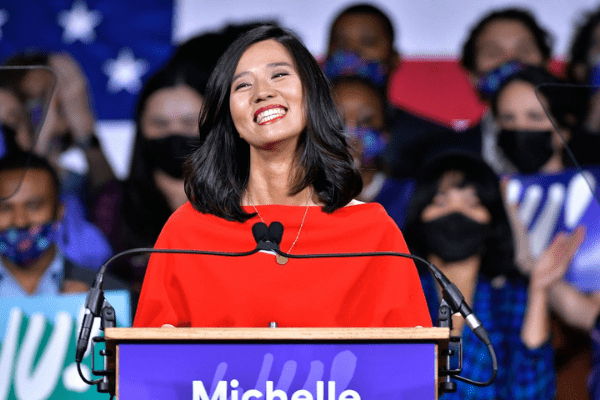For the first time in history, Boston has elected a female mayor, with Michelle Wu beating fellow female Democrat Annissa Essaibi George, whose parents are also migrants, to win the mayoral race on Tuesday.
Wu, a Harvard law graduate and eldest daughter of Taiwanese immigrants, also becomes the first non-white person to take up the city’s top position.
“I want to be clear — it wasn’t my vision on the ballot. It was ours, together,” she said in her victory speech.
“Although we’ve put in a lot of work to get to this day, our movement does not end here. We have a lot of work to do, so let’s dig in.”
Wu added that one of her sons remarked whether “sons can be elected mayor of Boston.”
“They have been, and they will someday again, but not tonight,” she said. “On this day, Boston elected your mom because from every corner of our city, Boston has spoken.”
“We are ready to meet this moment.”
“We are ready to become a Boston for everyone. We’re ready to be a Boston that doesn’t push people out, but welcomes all who call our city home.”
Wu will assume the position over Boston’s acting mayor, Kim Janey, who had filled in for Marty Walsh since March after he left to work as President Joe Biden’s labor secretary.
Former presidential candidate Elizabeth Warren, who taught Wu at Harvard Law School, Tweeted her congratulations:
“From teaching her in law school, to working together on my first Senate run, to supporting her campaigns, I’ve seen her positive energy, her good heart, and her ability to make big change for Boston,” Warren wrote. “She will be a terrific mayor.”
Annissa Essaibi George, whose parents are Polish and Tunisian, congratulated Wu in a gracious concession speech.
“She is the first woman, first person of colour, and as an Asian American, the first elected to be mayor of Boston,” the 47-year old said. “I know this is no small feat.”
In her campaign for mayor, which lasted over 400 days, the mother of two, who is married to real estate banker Conor Pewarski, focused on policies to reduce the city’s racial wealth gap, climate change, rent stabilisation and free public transport.
Wu has been focused on environmentalism since she was first elected to Boston’s city council in 2013, becoming the first Asian-American woman to serve in the council.
In 2019, the Boston City Council passed an important ordinance, introduced by Wu and follow councillor Matt O’Malley, which was designed to protect local wetlands while signally climate change adaptation in the city.
In August 2020, Wu announced plans for a program that aims to reach carbon neutrality for the municipal government buildings by 2024, running the city on 100 percent renewable energy by 2030, and getting citywide carbon neutrality by 2040.
Titled “Boston Green New Deal & Just Recovery,” the 49-page report which Wu released last year detailed strategies for combatting the consequences of climate change and its intersecting issues, including affordable housing, racial justice, economic opportunity, and transportation.
In an interview with CNBC Make It last September, Wu explained she never really harboured any ambitions to be a politician when she was younger.
“I’m the daughter of immigrants and my parents came to this country with nothing in their pockets and not speaking English and all of us kids were supposed to grow up and just get a stable job that kept us out of trouble,” she said. “So, that was what I was always aiming for.”
Her ambitions shifted after she began working as a consultant in Boston.
“I had just graduated [college] and I was working downtown in Boston and I got a call from my sister one day that said I had to go home right then and there and that something was very wrong and they needed help at home,” she said.
“In the depths of her mental health crisis, I was 22 or 23 years old and had to start raising my sisters and become the caregiver for my mom as well.”
“So, in that moment, I went from being someone who had been actively pushed away from ever thinking about politics and government to then having to deal with the structures and systems of the government over and over again in our daily lives and in our struggles against it.”
“Whether it was trying to care for my sisters and get them into the right school placements or get my mom health care for her situation.”


